Comprehensive Analysis: Legislation, Ethics in Travel and Tourism (UK)
VerifiedAdded on 2020/12/30
|14
|4353
|215
Report
AI Summary
This report offers a comprehensive overview of the legal and ethical considerations within the UK travel and tourism sector. It begins by outlining the legal and regulatory frameworks, including the Civil Aviation Act, maritime authorities, and ATOL, and discusses their implications for surface, air, and sea transport. The report then delves into the impacts of health, safety, and security legislation, emphasizing the responsibilities of businesses like Thomas Cook. It further examines contract and consumer protection legislation, highlighting customer rights and the importance of fair practices. Finally, the report addresses ethical dilemmas faced by the sector and explores corporate social responsibility (CSR) policies, using Thomas Cook as a case study to illustrate real-world applications of these concepts. The report aims to provide a clear understanding of the legal and ethical landscape within the UK travel and tourism industry.
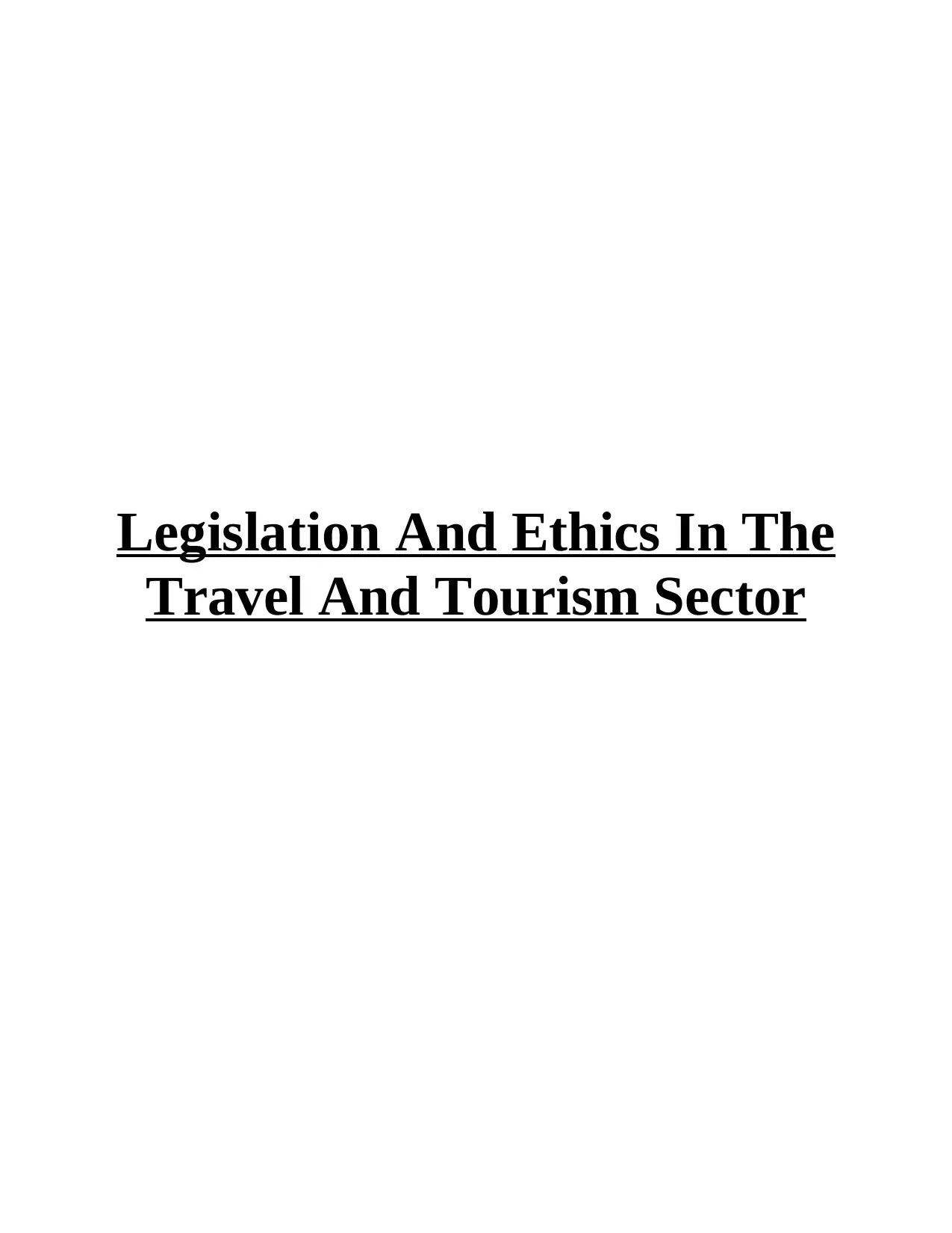
Legislation And Ethics In The
Travel And Tourism Sector
Travel And Tourism Sector
Paraphrase This Document
Need a fresh take? Get an instant paraphrase of this document with our AI Paraphraser
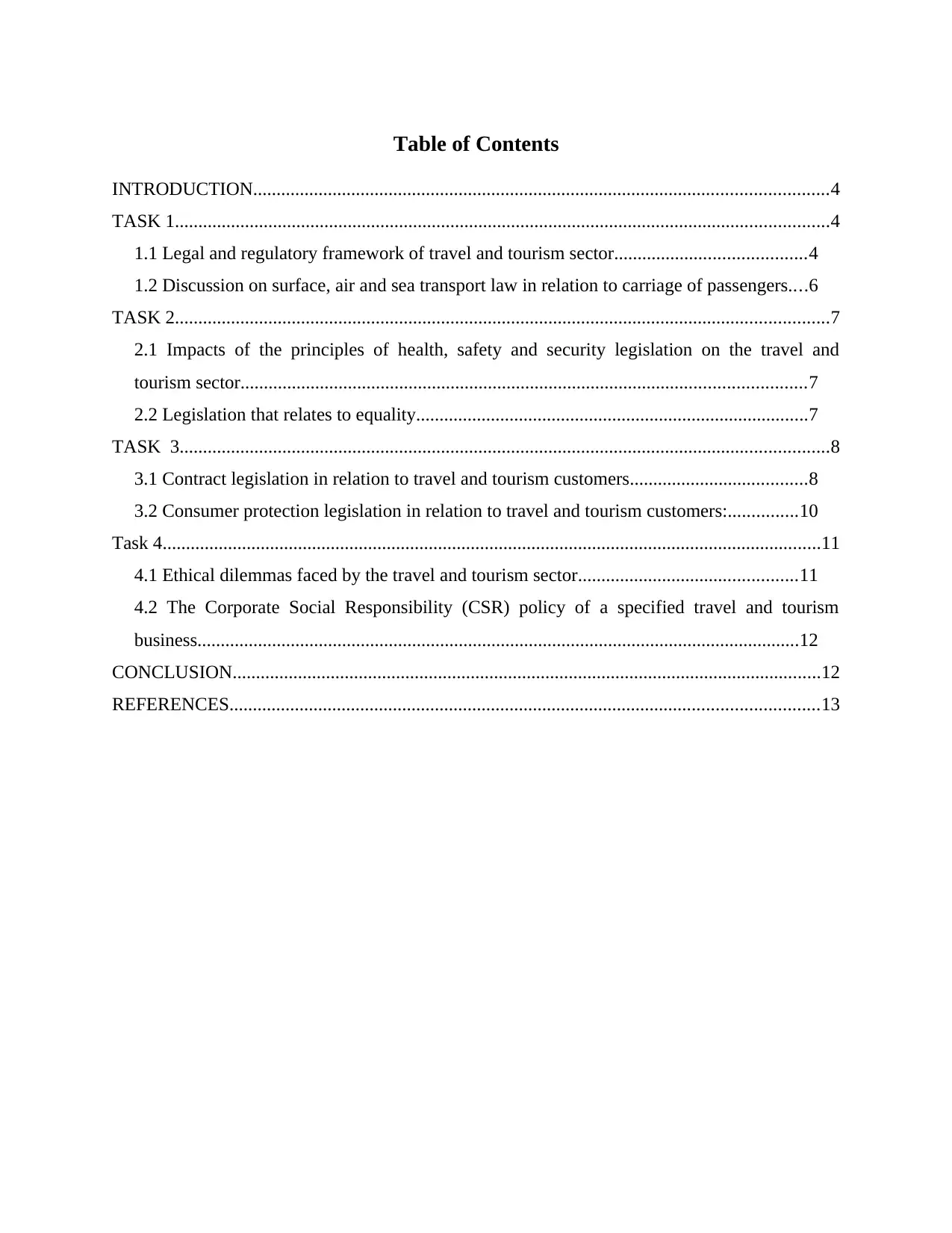
Table of Contents
INTRODUCTION...........................................................................................................................4
TASK 1............................................................................................................................................4
1.1 Legal and regulatory framework of travel and tourism sector.........................................4
1.2 Discussion on surface, air and sea transport law in relation to carriage of passengers....6
TASK 2............................................................................................................................................7
2.1 Impacts of the principles of health, safety and security legislation on the travel and
tourism sector.........................................................................................................................7
2.2 Legislation that relates to equality....................................................................................7
TASK 3...........................................................................................................................................8
3.1 Contract legislation in relation to travel and tourism customers......................................8
3.2 Consumer protection legislation in relation to travel and tourism customers:...............10
Task 4.............................................................................................................................................11
4.1 Ethical dilemmas faced by the travel and tourism sector...............................................11
4.2 The Corporate Social Responsibility (CSR) policy of a specified travel and tourism
business.................................................................................................................................12
CONCLUSION..............................................................................................................................12
REFERENCES..............................................................................................................................13
INTRODUCTION...........................................................................................................................4
TASK 1............................................................................................................................................4
1.1 Legal and regulatory framework of travel and tourism sector.........................................4
1.2 Discussion on surface, air and sea transport law in relation to carriage of passengers....6
TASK 2............................................................................................................................................7
2.1 Impacts of the principles of health, safety and security legislation on the travel and
tourism sector.........................................................................................................................7
2.2 Legislation that relates to equality....................................................................................7
TASK 3...........................................................................................................................................8
3.1 Contract legislation in relation to travel and tourism customers......................................8
3.2 Consumer protection legislation in relation to travel and tourism customers:...............10
Task 4.............................................................................................................................................11
4.1 Ethical dilemmas faced by the travel and tourism sector...............................................11
4.2 The Corporate Social Responsibility (CSR) policy of a specified travel and tourism
business.................................................................................................................................12
CONCLUSION..............................................................................................................................12
REFERENCES..............................................................................................................................13

⊘ This is a preview!⊘
Do you want full access?
Subscribe today to unlock all pages.

Trusted by 1+ million students worldwide
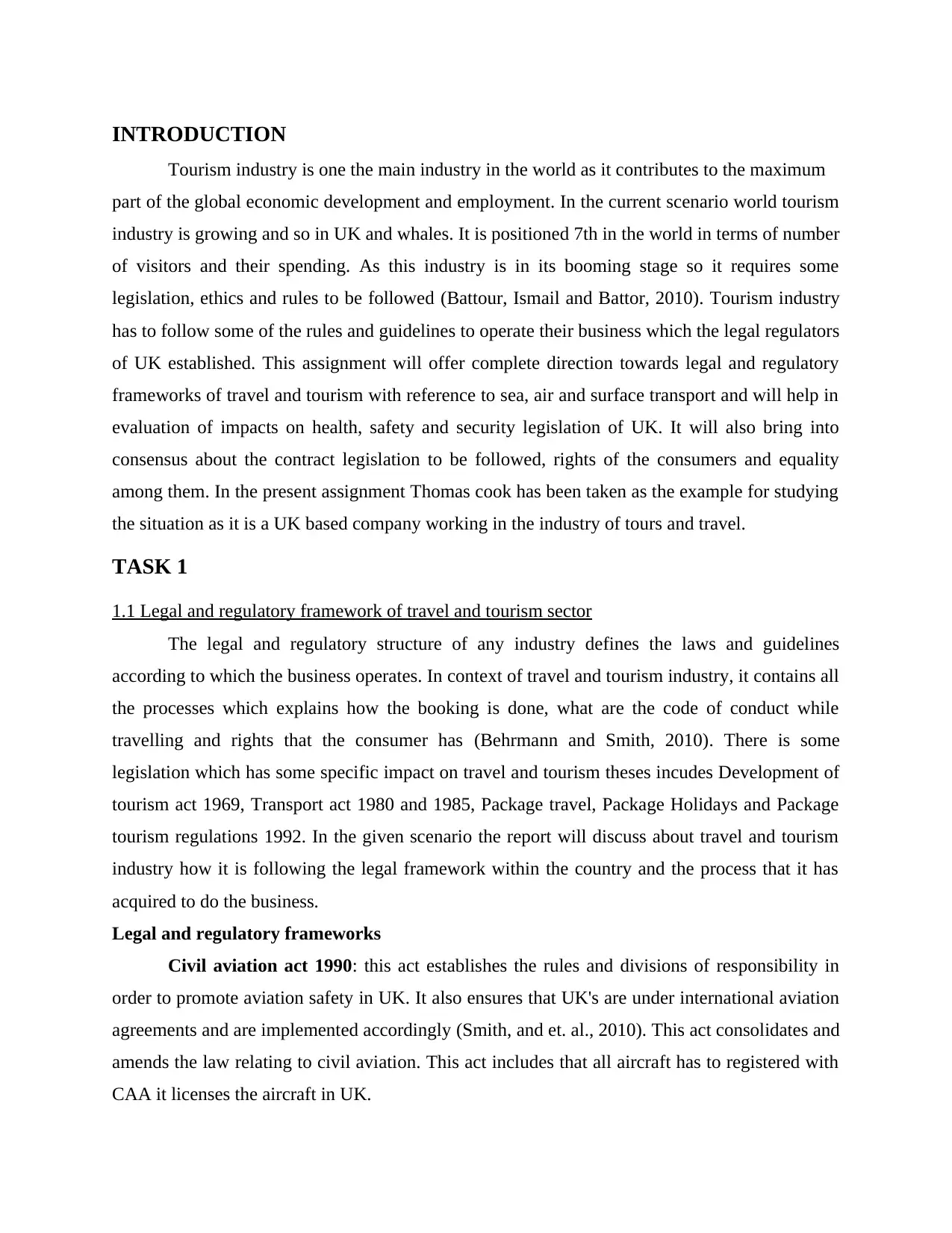
INTRODUCTION
Tourism industry is one the main industry in the world as it contributes to the maximum
part of the global economic development and employment. In the current scenario world tourism
industry is growing and so in UK and whales. It is positioned 7th in the world in terms of number
of visitors and their spending. As this industry is in its booming stage so it requires some
legislation, ethics and rules to be followed (Battour, Ismail and Battor, 2010). Tourism industry
has to follow some of the rules and guidelines to operate their business which the legal regulators
of UK established. This assignment will offer complete direction towards legal and regulatory
frameworks of travel and tourism with reference to sea, air and surface transport and will help in
evaluation of impacts on health, safety and security legislation of UK. It will also bring into
consensus about the contract legislation to be followed, rights of the consumers and equality
among them. In the present assignment Thomas cook has been taken as the example for studying
the situation as it is a UK based company working in the industry of tours and travel.
TASK 1
1.1 Legal and regulatory framework of travel and tourism sector
The legal and regulatory structure of any industry defines the laws and guidelines
according to which the business operates. In context of travel and tourism industry, it contains all
the processes which explains how the booking is done, what are the code of conduct while
travelling and rights that the consumer has (Behrmann and Smith, 2010). There is some
legislation which has some specific impact on travel and tourism theses incudes Development of
tourism act 1969, Transport act 1980 and 1985, Package travel, Package Holidays and Package
tourism regulations 1992. In the given scenario the report will discuss about travel and tourism
industry how it is following the legal framework within the country and the process that it has
acquired to do the business.
Legal and regulatory frameworks
Civil aviation act 1990: this act establishes the rules and divisions of responsibility in
order to promote aviation safety in UK. It also ensures that UK's are under international aviation
agreements and are implemented accordingly (Smith, and et. al., 2010). This act consolidates and
amends the law relating to civil aviation. This act includes that all aircraft has to registered with
CAA it licenses the aircraft in UK.
Tourism industry is one the main industry in the world as it contributes to the maximum
part of the global economic development and employment. In the current scenario world tourism
industry is growing and so in UK and whales. It is positioned 7th in the world in terms of number
of visitors and their spending. As this industry is in its booming stage so it requires some
legislation, ethics and rules to be followed (Battour, Ismail and Battor, 2010). Tourism industry
has to follow some of the rules and guidelines to operate their business which the legal regulators
of UK established. This assignment will offer complete direction towards legal and regulatory
frameworks of travel and tourism with reference to sea, air and surface transport and will help in
evaluation of impacts on health, safety and security legislation of UK. It will also bring into
consensus about the contract legislation to be followed, rights of the consumers and equality
among them. In the present assignment Thomas cook has been taken as the example for studying
the situation as it is a UK based company working in the industry of tours and travel.
TASK 1
1.1 Legal and regulatory framework of travel and tourism sector
The legal and regulatory structure of any industry defines the laws and guidelines
according to which the business operates. In context of travel and tourism industry, it contains all
the processes which explains how the booking is done, what are the code of conduct while
travelling and rights that the consumer has (Behrmann and Smith, 2010). There is some
legislation which has some specific impact on travel and tourism theses incudes Development of
tourism act 1969, Transport act 1980 and 1985, Package travel, Package Holidays and Package
tourism regulations 1992. In the given scenario the report will discuss about travel and tourism
industry how it is following the legal framework within the country and the process that it has
acquired to do the business.
Legal and regulatory frameworks
Civil aviation act 1990: this act establishes the rules and divisions of responsibility in
order to promote aviation safety in UK. It also ensures that UK's are under international aviation
agreements and are implemented accordingly (Smith, and et. al., 2010). This act consolidates and
amends the law relating to civil aviation. This act includes that all aircraft has to registered with
CAA it licenses the aircraft in UK.
Paraphrase This Document
Need a fresh take? Get an instant paraphrase of this document with our AI Paraphraser
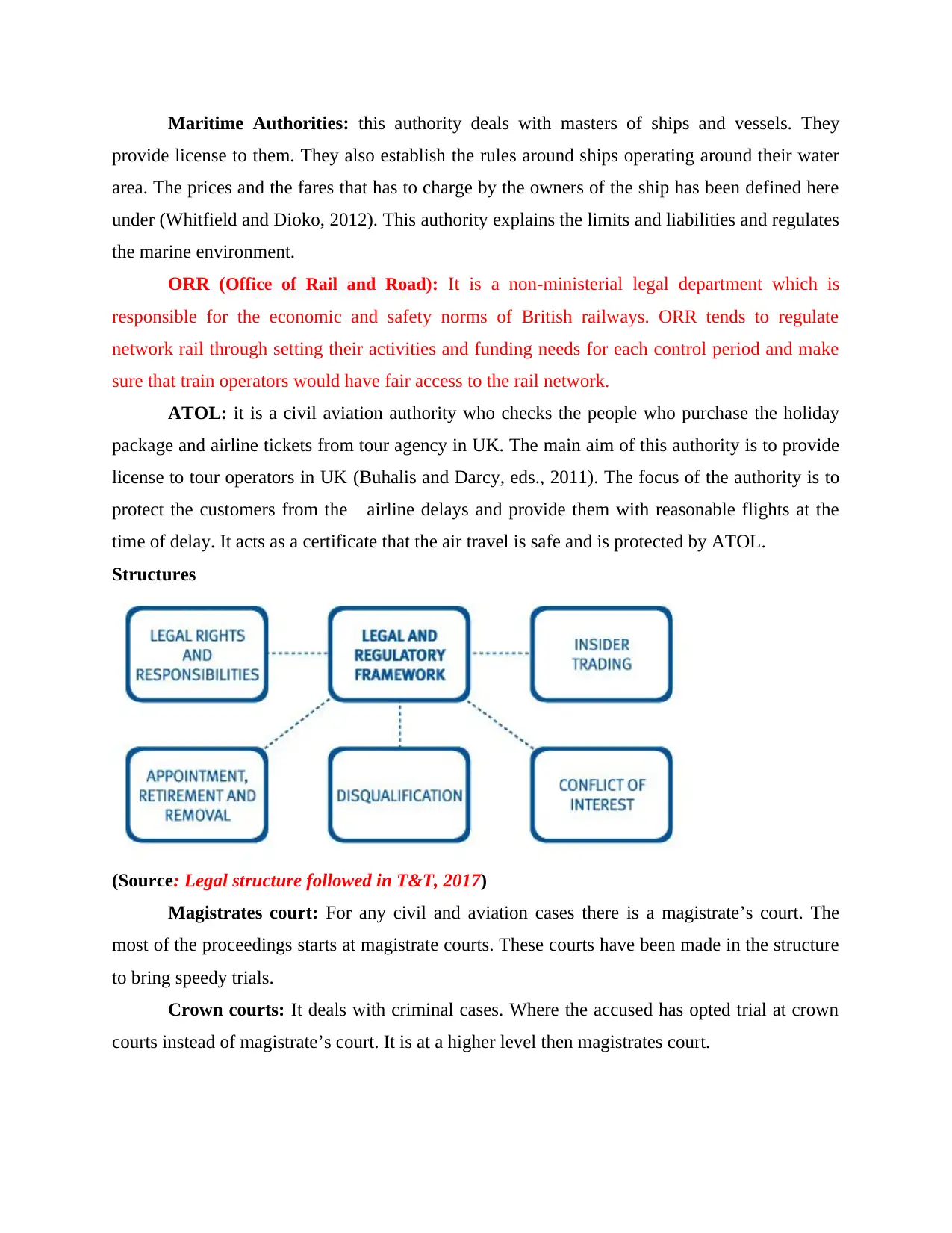
Maritime Authorities: this authority deals with masters of ships and vessels. They
provide license to them. They also establish the rules around ships operating around their water
area. The prices and the fares that has to charge by the owners of the ship has been defined here
under (Whitfield and Dioko, 2012). This authority explains the limits and liabilities and regulates
the marine environment.
ORR (Office of Rail and Road): It is a non-ministerial legal department which is
responsible for the economic and safety norms of British railways. ORR tends to regulate
network rail through setting their activities and funding needs for each control period and make
sure that train operators would have fair access to the rail network.
ATOL: it is a civil aviation authority who checks the people who purchase the holiday
package and airline tickets from tour agency in UK. The main aim of this authority is to provide
license to tour operators in UK (Buhalis and Darcy, eds., 2011). The focus of the authority is to
protect the customers from the airline delays and provide them with reasonable flights at the
time of delay. It acts as a certificate that the air travel is safe and is protected by ATOL.
Structures
(Source: Legal structure followed in T&T, 2017)
Magistrates court: For any civil and aviation cases there is a magistrate’s court. The
most of the proceedings starts at magistrate courts. These courts have been made in the structure
to bring speedy trials.
Crown courts: It deals with criminal cases. Where the accused has opted trial at crown
courts instead of magistrate’s court. It is at a higher level then magistrates court.
provide license to them. They also establish the rules around ships operating around their water
area. The prices and the fares that has to charge by the owners of the ship has been defined here
under (Whitfield and Dioko, 2012). This authority explains the limits and liabilities and regulates
the marine environment.
ORR (Office of Rail and Road): It is a non-ministerial legal department which is
responsible for the economic and safety norms of British railways. ORR tends to regulate
network rail through setting their activities and funding needs for each control period and make
sure that train operators would have fair access to the rail network.
ATOL: it is a civil aviation authority who checks the people who purchase the holiday
package and airline tickets from tour agency in UK. The main aim of this authority is to provide
license to tour operators in UK (Buhalis and Darcy, eds., 2011). The focus of the authority is to
protect the customers from the airline delays and provide them with reasonable flights at the
time of delay. It acts as a certificate that the air travel is safe and is protected by ATOL.
Structures
(Source: Legal structure followed in T&T, 2017)
Magistrates court: For any civil and aviation cases there is a magistrate’s court. The
most of the proceedings starts at magistrate courts. These courts have been made in the structure
to bring speedy trials.
Crown courts: It deals with criminal cases. Where the accused has opted trial at crown
courts instead of magistrate’s court. It is at a higher level then magistrates court.
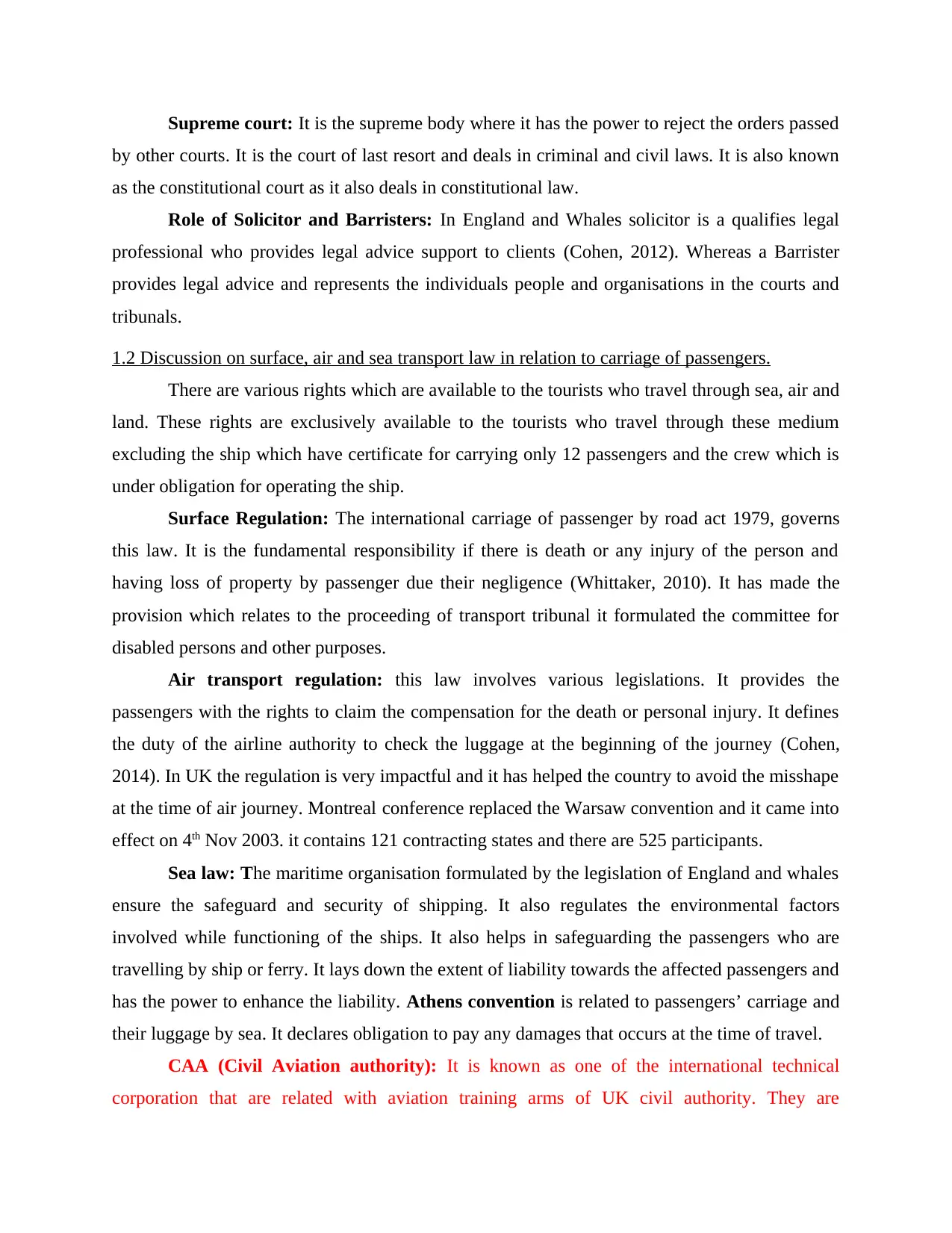
Supreme court: It is the supreme body where it has the power to reject the orders passed
by other courts. It is the court of last resort and deals in criminal and civil laws. It is also known
as the constitutional court as it also deals in constitutional law.
Role of Solicitor and Barristers: In England and Whales solicitor is a qualifies legal
professional who provides legal advice support to clients (Cohen, 2012). Whereas a Barrister
provides legal advice and represents the individuals people and organisations in the courts and
tribunals.
1.2 Discussion on surface, air and sea transport law in relation to carriage of passengers.
There are various rights which are available to the tourists who travel through sea, air and
land. These rights are exclusively available to the tourists who travel through these medium
excluding the ship which have certificate for carrying only 12 passengers and the crew which is
under obligation for operating the ship.
Surface Regulation: The international carriage of passenger by road act 1979, governs
this law. It is the fundamental responsibility if there is death or any injury of the person and
having loss of property by passenger due their negligence (Whittaker, 2010). It has made the
provision which relates to the proceeding of transport tribunal it formulated the committee for
disabled persons and other purposes.
Air transport regulation: this law involves various legislations. It provides the
passengers with the rights to claim the compensation for the death or personal injury. It defines
the duty of the airline authority to check the luggage at the beginning of the journey (Cohen,
2014). In UK the regulation is very impactful and it has helped the country to avoid the misshape
at the time of air journey. Montreal conference replaced the Warsaw convention and it came into
effect on 4th Nov 2003. it contains 121 contracting states and there are 525 participants.
Sea law: The maritime organisation formulated by the legislation of England and whales
ensure the safeguard and security of shipping. It also regulates the environmental factors
involved while functioning of the ships. It also helps in safeguarding the passengers who are
travelling by ship or ferry. It lays down the extent of liability towards the affected passengers and
has the power to enhance the liability. Athens convention is related to passengers’ carriage and
their luggage by sea. It declares obligation to pay any damages that occurs at the time of travel.
CAA (Civil Aviation authority): It is known as one of the international technical
corporation that are related with aviation training arms of UK civil authority. They are
by other courts. It is the court of last resort and deals in criminal and civil laws. It is also known
as the constitutional court as it also deals in constitutional law.
Role of Solicitor and Barristers: In England and Whales solicitor is a qualifies legal
professional who provides legal advice support to clients (Cohen, 2012). Whereas a Barrister
provides legal advice and represents the individuals people and organisations in the courts and
tribunals.
1.2 Discussion on surface, air and sea transport law in relation to carriage of passengers.
There are various rights which are available to the tourists who travel through sea, air and
land. These rights are exclusively available to the tourists who travel through these medium
excluding the ship which have certificate for carrying only 12 passengers and the crew which is
under obligation for operating the ship.
Surface Regulation: The international carriage of passenger by road act 1979, governs
this law. It is the fundamental responsibility if there is death or any injury of the person and
having loss of property by passenger due their negligence (Whittaker, 2010). It has made the
provision which relates to the proceeding of transport tribunal it formulated the committee for
disabled persons and other purposes.
Air transport regulation: this law involves various legislations. It provides the
passengers with the rights to claim the compensation for the death or personal injury. It defines
the duty of the airline authority to check the luggage at the beginning of the journey (Cohen,
2014). In UK the regulation is very impactful and it has helped the country to avoid the misshape
at the time of air journey. Montreal conference replaced the Warsaw convention and it came into
effect on 4th Nov 2003. it contains 121 contracting states and there are 525 participants.
Sea law: The maritime organisation formulated by the legislation of England and whales
ensure the safeguard and security of shipping. It also regulates the environmental factors
involved while functioning of the ships. It also helps in safeguarding the passengers who are
travelling by ship or ferry. It lays down the extent of liability towards the affected passengers and
has the power to enhance the liability. Athens convention is related to passengers’ carriage and
their luggage by sea. It declares obligation to pay any damages that occurs at the time of travel.
CAA (Civil Aviation authority): It is known as one of the international technical
corporation that are related with aviation training arms of UK civil authority. They are
⊘ This is a preview!⊘
Do you want full access?
Subscribe today to unlock all pages.

Trusted by 1+ million students worldwide
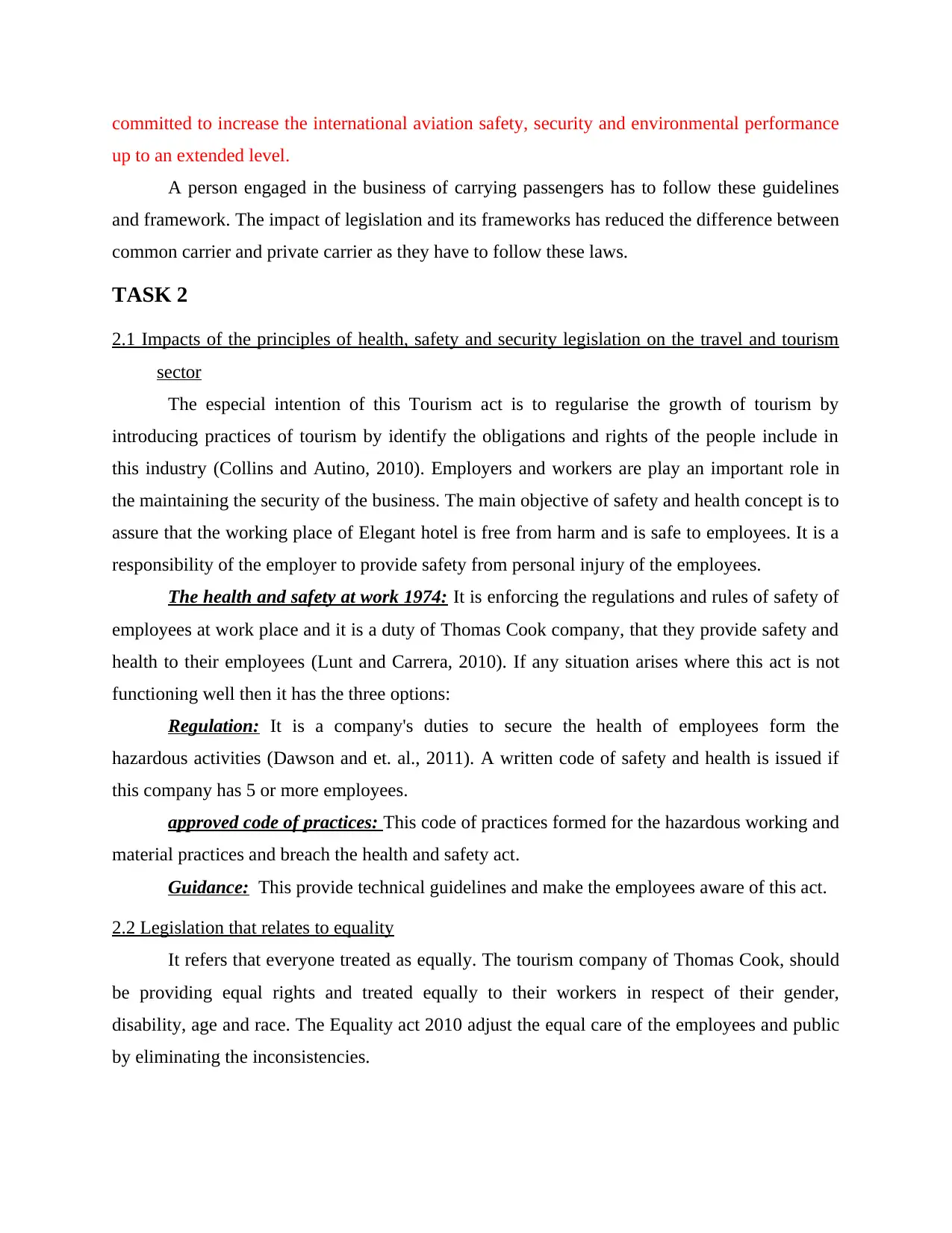
committed to increase the international aviation safety, security and environmental performance
up to an extended level.
A person engaged in the business of carrying passengers has to follow these guidelines
and framework. The impact of legislation and its frameworks has reduced the difference between
common carrier and private carrier as they have to follow these laws.
TASK 2
2.1 Impacts of the principles of health, safety and security legislation on the travel and tourism
sector
The especial intention of this Tourism act is to regularise the growth of tourism by
introducing practices of tourism by identify the obligations and rights of the people include in
this industry (Collins and Autino, 2010). Employers and workers are play an important role in
the maintaining the security of the business. The main objective of safety and health concept is to
assure that the working place of Elegant hotel is free from harm and is safe to employees. It is a
responsibility of the employer to provide safety from personal injury of the employees.
The health and safety at work 1974: It is enforcing the regulations and rules of safety of
employees at work place and it is a duty of Thomas Cook company, that they provide safety and
health to their employees (Lunt and Carrera, 2010). If any situation arises where this act is not
functioning well then it has the three options:
Regulation: It is a company's duties to secure the health of employees form the
hazardous activities (Dawson and et. al., 2011). A written code of safety and health is issued if
this company has 5 or more employees.
approved code of practices: This code of practices formed for the hazardous working and
material practices and breach the health and safety act.
Guidance: This provide technical guidelines and make the employees aware of this act.
2.2 Legislation that relates to equality
It refers that everyone treated as equally. The tourism company of Thomas Cook, should
be providing equal rights and treated equally to their workers in respect of their gender,
disability, age and race. The Equality act 2010 adjust the equal care of the employees and public
by eliminating the inconsistencies.
up to an extended level.
A person engaged in the business of carrying passengers has to follow these guidelines
and framework. The impact of legislation and its frameworks has reduced the difference between
common carrier and private carrier as they have to follow these laws.
TASK 2
2.1 Impacts of the principles of health, safety and security legislation on the travel and tourism
sector
The especial intention of this Tourism act is to regularise the growth of tourism by
introducing practices of tourism by identify the obligations and rights of the people include in
this industry (Collins and Autino, 2010). Employers and workers are play an important role in
the maintaining the security of the business. The main objective of safety and health concept is to
assure that the working place of Elegant hotel is free from harm and is safe to employees. It is a
responsibility of the employer to provide safety from personal injury of the employees.
The health and safety at work 1974: It is enforcing the regulations and rules of safety of
employees at work place and it is a duty of Thomas Cook company, that they provide safety and
health to their employees (Lunt and Carrera, 2010). If any situation arises where this act is not
functioning well then it has the three options:
Regulation: It is a company's duties to secure the health of employees form the
hazardous activities (Dawson and et. al., 2011). A written code of safety and health is issued if
this company has 5 or more employees.
approved code of practices: This code of practices formed for the hazardous working and
material practices and breach the health and safety act.
Guidance: This provide technical guidelines and make the employees aware of this act.
2.2 Legislation that relates to equality
It refers that everyone treated as equally. The tourism company of Thomas Cook, should
be providing equal rights and treated equally to their workers in respect of their gender,
disability, age and race. The Equality act 2010 adjust the equal care of the employees and public
by eliminating the inconsistencies.
Paraphrase This Document
Need a fresh take? Get an instant paraphrase of this document with our AI Paraphraser
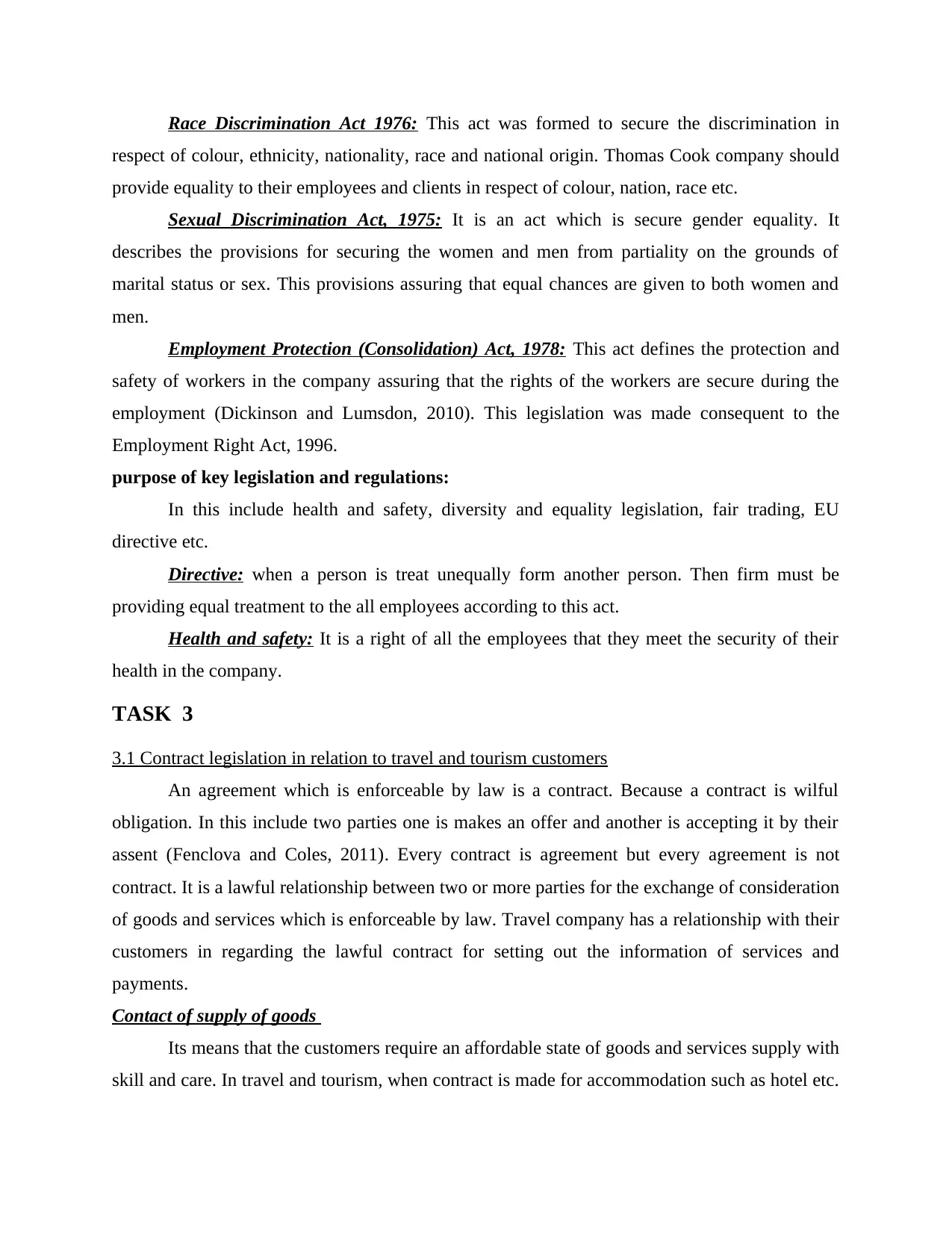
Race Discrimination Act 1976: This act was formed to secure the discrimination in
respect of colour, ethnicity, nationality, race and national origin. Thomas Cook company should
provide equality to their employees and clients in respect of colour, nation, race etc.
Sexual Discrimination Act, 1975: It is an act which is secure gender equality. It
describes the provisions for securing the women and men from partiality on the grounds of
marital status or sex. This provisions assuring that equal chances are given to both women and
men.
Employment Protection (Consolidation) Act, 1978: This act defines the protection and
safety of workers in the company assuring that the rights of the workers are secure during the
employment (Dickinson and Lumsdon, 2010). This legislation was made consequent to the
Employment Right Act, 1996.
purpose of key legislation and regulations:
In this include health and safety, diversity and equality legislation, fair trading, EU
directive etc.
Directive: when a person is treat unequally form another person. Then firm must be
providing equal treatment to the all employees according to this act.
Health and safety: It is a right of all the employees that they meet the security of their
health in the company.
TASK 3
3.1 Contract legislation in relation to travel and tourism customers
An agreement which is enforceable by law is a contract. Because a contract is wilful
obligation. In this include two parties one is makes an offer and another is accepting it by their
assent (Fenclova and Coles, 2011). Every contract is agreement but every agreement is not
contract. It is a lawful relationship between two or more parties for the exchange of consideration
of goods and services which is enforceable by law. Travel company has a relationship with their
customers in regarding the lawful contract for setting out the information of services and
payments.
Contact of supply of goods
Its means that the customers require an affordable state of goods and services supply with
skill and care. In travel and tourism, when contract is made for accommodation such as hotel etc.
respect of colour, ethnicity, nationality, race and national origin. Thomas Cook company should
provide equality to their employees and clients in respect of colour, nation, race etc.
Sexual Discrimination Act, 1975: It is an act which is secure gender equality. It
describes the provisions for securing the women and men from partiality on the grounds of
marital status or sex. This provisions assuring that equal chances are given to both women and
men.
Employment Protection (Consolidation) Act, 1978: This act defines the protection and
safety of workers in the company assuring that the rights of the workers are secure during the
employment (Dickinson and Lumsdon, 2010). This legislation was made consequent to the
Employment Right Act, 1996.
purpose of key legislation and regulations:
In this include health and safety, diversity and equality legislation, fair trading, EU
directive etc.
Directive: when a person is treat unequally form another person. Then firm must be
providing equal treatment to the all employees according to this act.
Health and safety: It is a right of all the employees that they meet the security of their
health in the company.
TASK 3
3.1 Contract legislation in relation to travel and tourism customers
An agreement which is enforceable by law is a contract. Because a contract is wilful
obligation. In this include two parties one is makes an offer and another is accepting it by their
assent (Fenclova and Coles, 2011). Every contract is agreement but every agreement is not
contract. It is a lawful relationship between two or more parties for the exchange of consideration
of goods and services which is enforceable by law. Travel company has a relationship with their
customers in regarding the lawful contract for setting out the information of services and
payments.
Contact of supply of goods
Its means that the customers require an affordable state of goods and services supply with
skill and care. In travel and tourism, when contract is made for accommodation such as hotel etc.
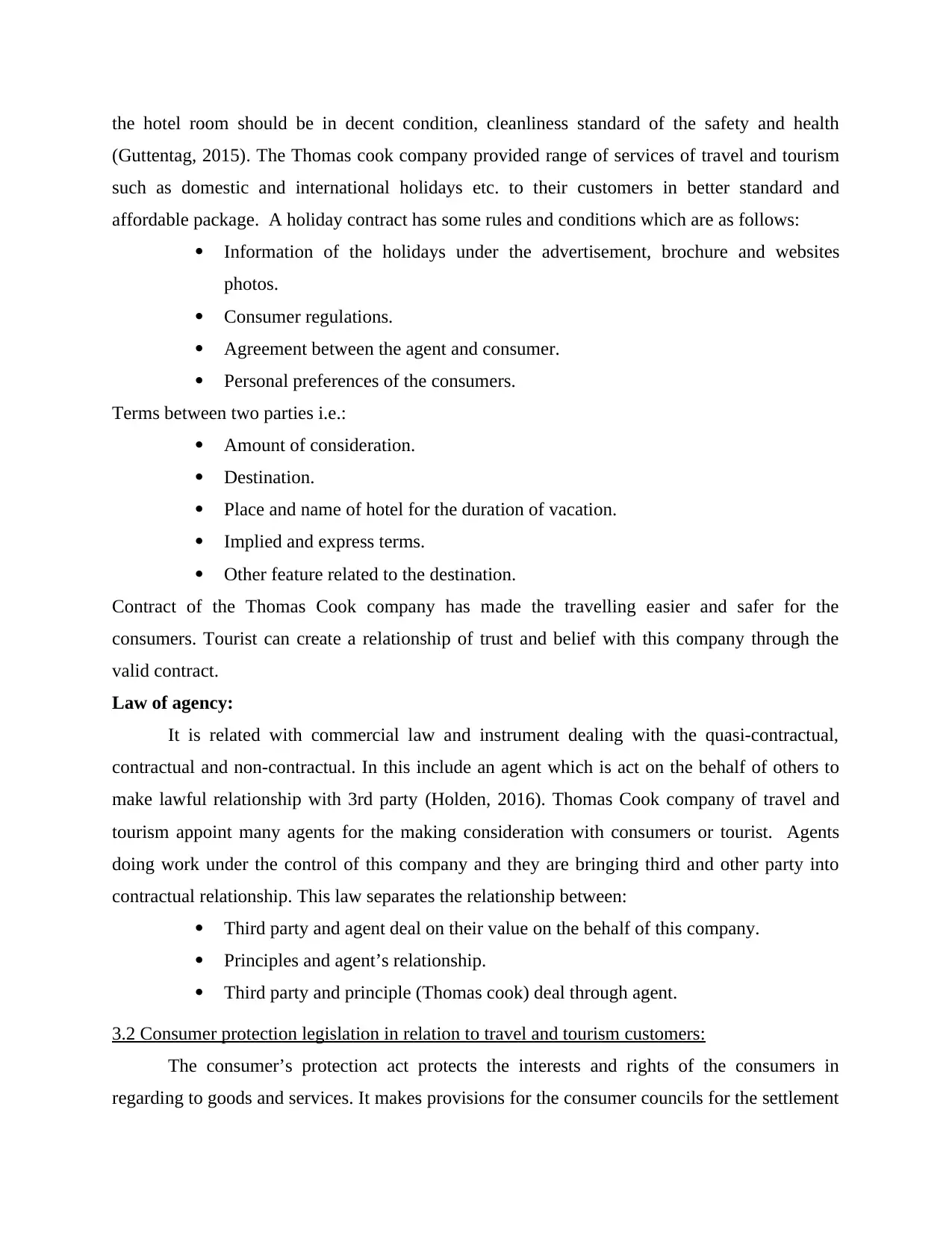
the hotel room should be in decent condition, cleanliness standard of the safety and health
(Guttentag, 2015). The Thomas cook company provided range of services of travel and tourism
such as domestic and international holidays etc. to their customers in better standard and
affordable package. A holiday contract has some rules and conditions which are as follows:
Information of the holidays under the advertisement, brochure and websites
photos.
Consumer regulations.
Agreement between the agent and consumer.
Personal preferences of the consumers.
Terms between two parties i.e.:
Amount of consideration.
Destination.
Place and name of hotel for the duration of vacation.
Implied and express terms.
Other feature related to the destination.
Contract of the Thomas Cook company has made the travelling easier and safer for the
consumers. Tourist can create a relationship of trust and belief with this company through the
valid contract.
Law of agency:
It is related with commercial law and instrument dealing with the quasi-contractual,
contractual and non-contractual. In this include an agent which is act on the behalf of others to
make lawful relationship with 3rd party (Holden, 2016). Thomas Cook company of travel and
tourism appoint many agents for the making consideration with consumers or tourist. Agents
doing work under the control of this company and they are bringing third and other party into
contractual relationship. This law separates the relationship between:
Third party and agent deal on their value on the behalf of this company.
Principles and agent’s relationship.
Third party and principle (Thomas cook) deal through agent.
3.2 Consumer protection legislation in relation to travel and tourism customers:
The consumer’s protection act protects the interests and rights of the consumers in
regarding to goods and services. It makes provisions for the consumer councils for the settlement
(Guttentag, 2015). The Thomas cook company provided range of services of travel and tourism
such as domestic and international holidays etc. to their customers in better standard and
affordable package. A holiday contract has some rules and conditions which are as follows:
Information of the holidays under the advertisement, brochure and websites
photos.
Consumer regulations.
Agreement between the agent and consumer.
Personal preferences of the consumers.
Terms between two parties i.e.:
Amount of consideration.
Destination.
Place and name of hotel for the duration of vacation.
Implied and express terms.
Other feature related to the destination.
Contract of the Thomas Cook company has made the travelling easier and safer for the
consumers. Tourist can create a relationship of trust and belief with this company through the
valid contract.
Law of agency:
It is related with commercial law and instrument dealing with the quasi-contractual,
contractual and non-contractual. In this include an agent which is act on the behalf of others to
make lawful relationship with 3rd party (Holden, 2016). Thomas Cook company of travel and
tourism appoint many agents for the making consideration with consumers or tourist. Agents
doing work under the control of this company and they are bringing third and other party into
contractual relationship. This law separates the relationship between:
Third party and agent deal on their value on the behalf of this company.
Principles and agent’s relationship.
Third party and principle (Thomas cook) deal through agent.
3.2 Consumer protection legislation in relation to travel and tourism customers:
The consumer’s protection act protects the interests and rights of the consumers in
regarding to goods and services. It makes provisions for the consumer councils for the settlement
⊘ This is a preview!⊘
Do you want full access?
Subscribe today to unlock all pages.

Trusted by 1+ million students worldwide
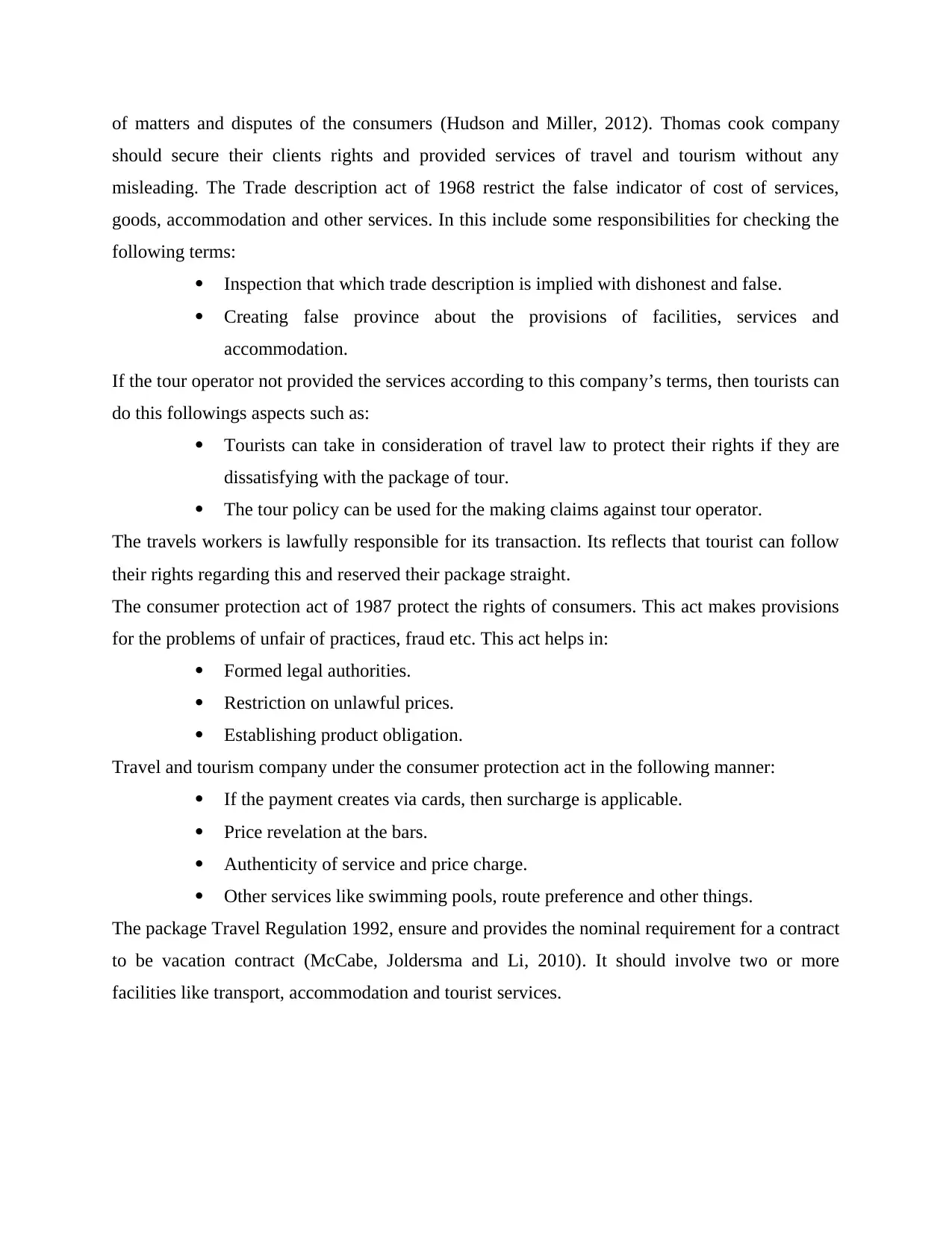
of matters and disputes of the consumers (Hudson and Miller, 2012). Thomas cook company
should secure their clients rights and provided services of travel and tourism without any
misleading. The Trade description act of 1968 restrict the false indicator of cost of services,
goods, accommodation and other services. In this include some responsibilities for checking the
following terms:
Inspection that which trade description is implied with dishonest and false.
Creating false province about the provisions of facilities, services and
accommodation.
If the tour operator not provided the services according to this company’s terms, then tourists can
do this followings aspects such as:
Tourists can take in consideration of travel law to protect their rights if they are
dissatisfying with the package of tour.
The tour policy can be used for the making claims against tour operator.
The travels workers is lawfully responsible for its transaction. Its reflects that tourist can follow
their rights regarding this and reserved their package straight.
The consumer protection act of 1987 protect the rights of consumers. This act makes provisions
for the problems of unfair of practices, fraud etc. This act helps in:
Formed legal authorities.
Restriction on unlawful prices.
Establishing product obligation.
Travel and tourism company under the consumer protection act in the following manner:
If the payment creates via cards, then surcharge is applicable.
Price revelation at the bars.
Authenticity of service and price charge.
Other services like swimming pools, route preference and other things.
The package Travel Regulation 1992, ensure and provides the nominal requirement for a contract
to be vacation contract (McCabe, Joldersma and Li, 2010). It should involve two or more
facilities like transport, accommodation and tourist services.
should secure their clients rights and provided services of travel and tourism without any
misleading. The Trade description act of 1968 restrict the false indicator of cost of services,
goods, accommodation and other services. In this include some responsibilities for checking the
following terms:
Inspection that which trade description is implied with dishonest and false.
Creating false province about the provisions of facilities, services and
accommodation.
If the tour operator not provided the services according to this company’s terms, then tourists can
do this followings aspects such as:
Tourists can take in consideration of travel law to protect their rights if they are
dissatisfying with the package of tour.
The tour policy can be used for the making claims against tour operator.
The travels workers is lawfully responsible for its transaction. Its reflects that tourist can follow
their rights regarding this and reserved their package straight.
The consumer protection act of 1987 protect the rights of consumers. This act makes provisions
for the problems of unfair of practices, fraud etc. This act helps in:
Formed legal authorities.
Restriction on unlawful prices.
Establishing product obligation.
Travel and tourism company under the consumer protection act in the following manner:
If the payment creates via cards, then surcharge is applicable.
Price revelation at the bars.
Authenticity of service and price charge.
Other services like swimming pools, route preference and other things.
The package Travel Regulation 1992, ensure and provides the nominal requirement for a contract
to be vacation contract (McCabe, Joldersma and Li, 2010). It should involve two or more
facilities like transport, accommodation and tourist services.
Paraphrase This Document
Need a fresh take? Get an instant paraphrase of this document with our AI Paraphraser
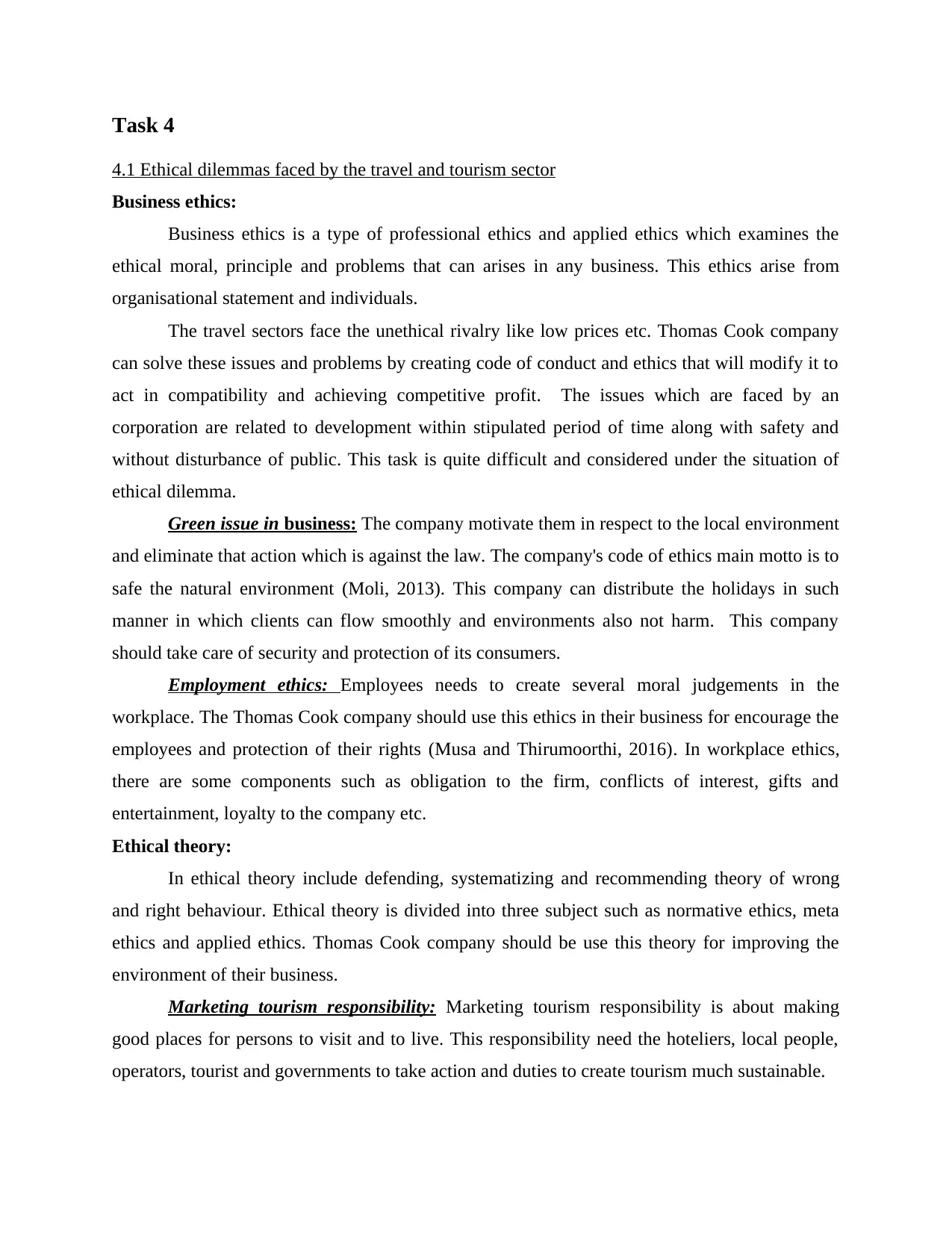
Task 4
4.1 Ethical dilemmas faced by the travel and tourism sector
Business ethics:
Business ethics is a type of professional ethics and applied ethics which examines the
ethical moral, principle and problems that can arises in any business. This ethics arise from
organisational statement and individuals.
The travel sectors face the unethical rivalry like low prices etc. Thomas Cook company
can solve these issues and problems by creating code of conduct and ethics that will modify it to
act in compatibility and achieving competitive profit. The issues which are faced by an
corporation are related to development within stipulated period of time along with safety and
without disturbance of public. This task is quite difficult and considered under the situation of
ethical dilemma.
Green issue in business: The company motivate them in respect to the local environment
and eliminate that action which is against the law. The company's code of ethics main motto is to
safe the natural environment (Moli, 2013). This company can distribute the holidays in such
manner in which clients can flow smoothly and environments also not harm. This company
should take care of security and protection of its consumers.
Employment ethics: Employees needs to create several moral judgements in the
workplace. The Thomas Cook company should use this ethics in their business for encourage the
employees and protection of their rights (Musa and Thirumoorthi, 2016). In workplace ethics,
there are some components such as obligation to the firm, conflicts of interest, gifts and
entertainment, loyalty to the company etc.
Ethical theory:
In ethical theory include defending, systematizing and recommending theory of wrong
and right behaviour. Ethical theory is divided into three subject such as normative ethics, meta
ethics and applied ethics. Thomas Cook company should be use this theory for improving the
environment of their business.
Marketing tourism responsibility: Marketing tourism responsibility is about making
good places for persons to visit and to live. This responsibility need the hoteliers, local people,
operators, tourist and governments to take action and duties to create tourism much sustainable.
4.1 Ethical dilemmas faced by the travel and tourism sector
Business ethics:
Business ethics is a type of professional ethics and applied ethics which examines the
ethical moral, principle and problems that can arises in any business. This ethics arise from
organisational statement and individuals.
The travel sectors face the unethical rivalry like low prices etc. Thomas Cook company
can solve these issues and problems by creating code of conduct and ethics that will modify it to
act in compatibility and achieving competitive profit. The issues which are faced by an
corporation are related to development within stipulated period of time along with safety and
without disturbance of public. This task is quite difficult and considered under the situation of
ethical dilemma.
Green issue in business: The company motivate them in respect to the local environment
and eliminate that action which is against the law. The company's code of ethics main motto is to
safe the natural environment (Moli, 2013). This company can distribute the holidays in such
manner in which clients can flow smoothly and environments also not harm. This company
should take care of security and protection of its consumers.
Employment ethics: Employees needs to create several moral judgements in the
workplace. The Thomas Cook company should use this ethics in their business for encourage the
employees and protection of their rights (Musa and Thirumoorthi, 2016). In workplace ethics,
there are some components such as obligation to the firm, conflicts of interest, gifts and
entertainment, loyalty to the company etc.
Ethical theory:
In ethical theory include defending, systematizing and recommending theory of wrong
and right behaviour. Ethical theory is divided into three subject such as normative ethics, meta
ethics and applied ethics. Thomas Cook company should be use this theory for improving the
environment of their business.
Marketing tourism responsibility: Marketing tourism responsibility is about making
good places for persons to visit and to live. This responsibility need the hoteliers, local people,
operators, tourist and governments to take action and duties to create tourism much sustainable.
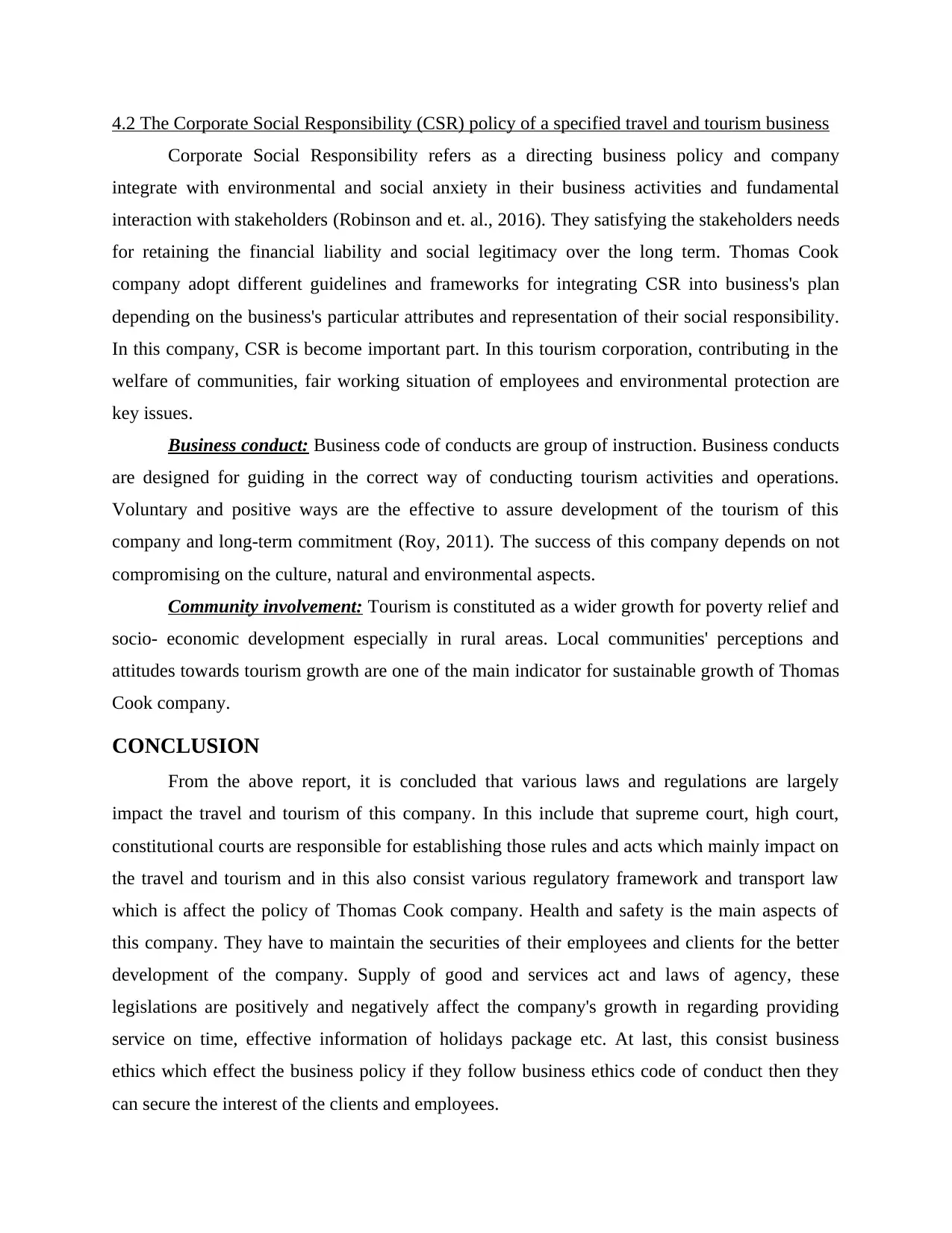
4.2 The Corporate Social Responsibility (CSR) policy of a specified travel and tourism business
Corporate Social Responsibility refers as a directing business policy and company
integrate with environmental and social anxiety in their business activities and fundamental
interaction with stakeholders (Robinson and et. al., 2016). They satisfying the stakeholders needs
for retaining the financial liability and social legitimacy over the long term. Thomas Cook
company adopt different guidelines and frameworks for integrating CSR into business's plan
depending on the business's particular attributes and representation of their social responsibility.
In this company, CSR is become important part. In this tourism corporation, contributing in the
welfare of communities, fair working situation of employees and environmental protection are
key issues.
Business conduct: Business code of conducts are group of instruction. Business conducts
are designed for guiding in the correct way of conducting tourism activities and operations.
Voluntary and positive ways are the effective to assure development of the tourism of this
company and long-term commitment (Roy, 2011). The success of this company depends on not
compromising on the culture, natural and environmental aspects.
Community involvement: Tourism is constituted as a wider growth for poverty relief and
socio- economic development especially in rural areas. Local communities' perceptions and
attitudes towards tourism growth are one of the main indicator for sustainable growth of Thomas
Cook company.
CONCLUSION
From the above report, it is concluded that various laws and regulations are largely
impact the travel and tourism of this company. In this include that supreme court, high court,
constitutional courts are responsible for establishing those rules and acts which mainly impact on
the travel and tourism and in this also consist various regulatory framework and transport law
which is affect the policy of Thomas Cook company. Health and safety is the main aspects of
this company. They have to maintain the securities of their employees and clients for the better
development of the company. Supply of good and services act and laws of agency, these
legislations are positively and negatively affect the company's growth in regarding providing
service on time, effective information of holidays package etc. At last, this consist business
ethics which effect the business policy if they follow business ethics code of conduct then they
can secure the interest of the clients and employees.
Corporate Social Responsibility refers as a directing business policy and company
integrate with environmental and social anxiety in their business activities and fundamental
interaction with stakeholders (Robinson and et. al., 2016). They satisfying the stakeholders needs
for retaining the financial liability and social legitimacy over the long term. Thomas Cook
company adopt different guidelines and frameworks for integrating CSR into business's plan
depending on the business's particular attributes and representation of their social responsibility.
In this company, CSR is become important part. In this tourism corporation, contributing in the
welfare of communities, fair working situation of employees and environmental protection are
key issues.
Business conduct: Business code of conducts are group of instruction. Business conducts
are designed for guiding in the correct way of conducting tourism activities and operations.
Voluntary and positive ways are the effective to assure development of the tourism of this
company and long-term commitment (Roy, 2011). The success of this company depends on not
compromising on the culture, natural and environmental aspects.
Community involvement: Tourism is constituted as a wider growth for poverty relief and
socio- economic development especially in rural areas. Local communities' perceptions and
attitudes towards tourism growth are one of the main indicator for sustainable growth of Thomas
Cook company.
CONCLUSION
From the above report, it is concluded that various laws and regulations are largely
impact the travel and tourism of this company. In this include that supreme court, high court,
constitutional courts are responsible for establishing those rules and acts which mainly impact on
the travel and tourism and in this also consist various regulatory framework and transport law
which is affect the policy of Thomas Cook company. Health and safety is the main aspects of
this company. They have to maintain the securities of their employees and clients for the better
development of the company. Supply of good and services act and laws of agency, these
legislations are positively and negatively affect the company's growth in regarding providing
service on time, effective information of holidays package etc. At last, this consist business
ethics which effect the business policy if they follow business ethics code of conduct then they
can secure the interest of the clients and employees.
⊘ This is a preview!⊘
Do you want full access?
Subscribe today to unlock all pages.

Trusted by 1+ million students worldwide
1 out of 14
Related Documents
Your All-in-One AI-Powered Toolkit for Academic Success.
+13062052269
info@desklib.com
Available 24*7 on WhatsApp / Email
![[object Object]](/_next/static/media/star-bottom.7253800d.svg)
Unlock your academic potential
Copyright © 2020–2026 A2Z Services. All Rights Reserved. Developed and managed by ZUCOL.




